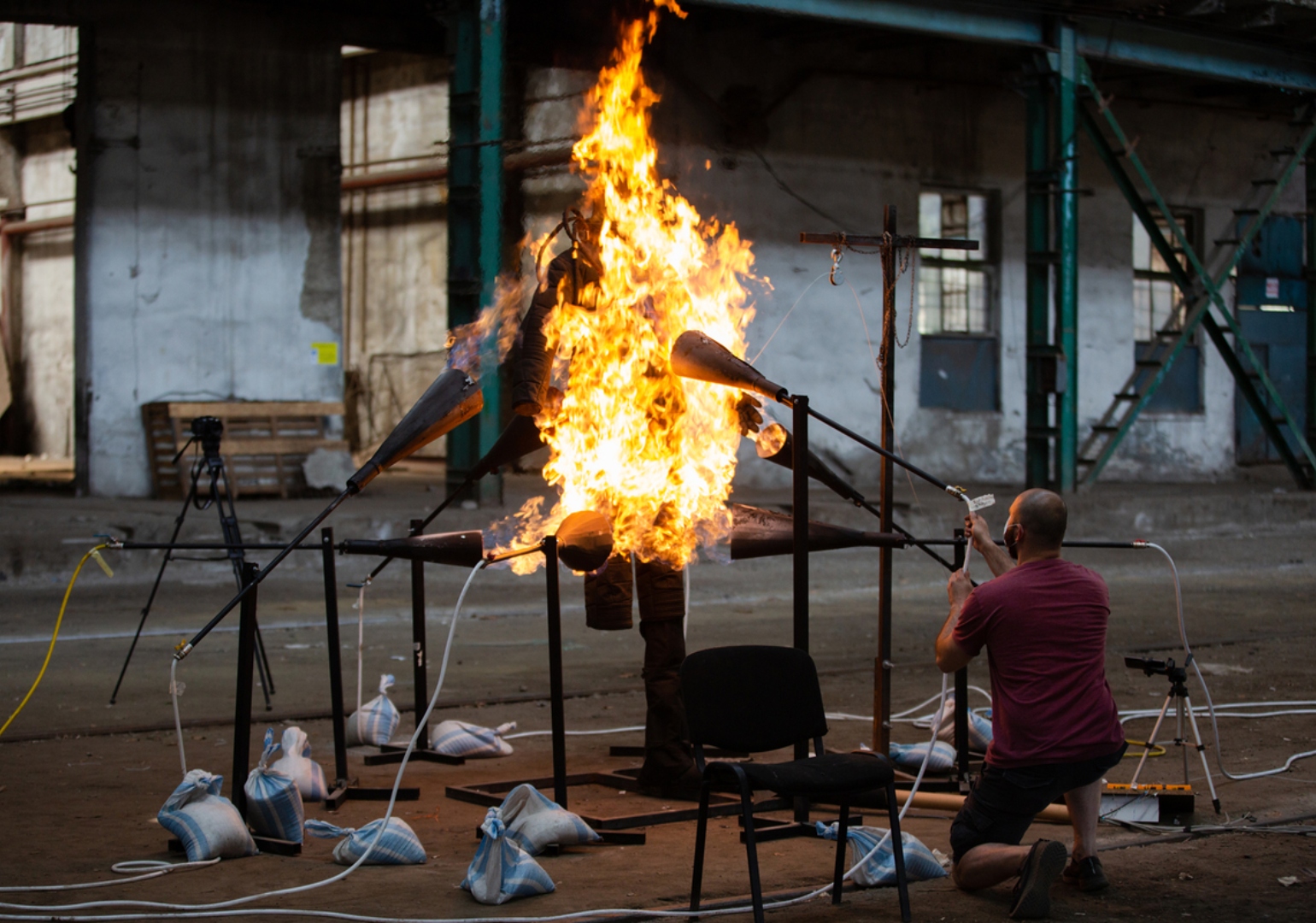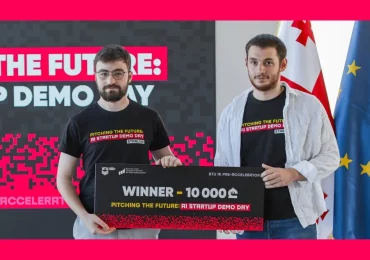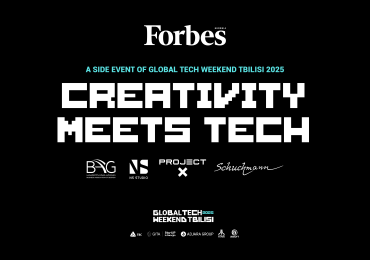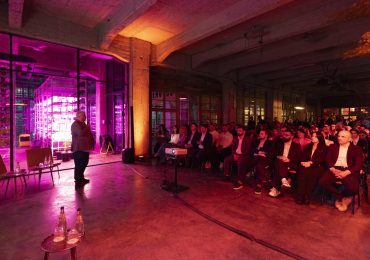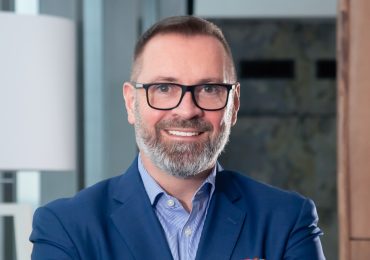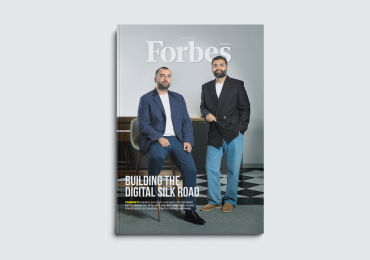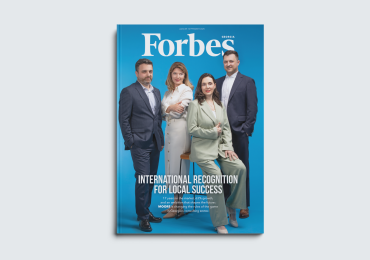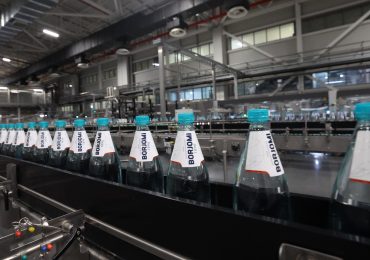Electric vehicles boast numerous advantages but face a critical challenge: lithium batteries are prone to spontaneous combustion. To address this, the Georgian-American company Elven Technologies has developed a groundbreaking material that can endure 2,000°C flames for hours and extinguish fires caused by battery ignition. The company is now developing its products in Estonia, and the world’s largest automakers are awaiting the results of its work.
“Any sorcery we encounter in books or on screens is simply advanced technology disguised as magic,” says Vamekh Kherkheulidze, CEO of Elven Technologies, explaining that the company’s name draws inspiration from elves and the realm of fantasy. It is hard to disagree with Vamekh: properly refined technology can replicate any form of magic. For example, the company’s first product – a firefighter suit – would have been helpful to any fairy tale character entering a cave to face a dragon.
Vamekh and his friends began working on a flexible, lightweight, fireproof material in 2019. “At first, we wanted to create a new type of spacesuit, but then we realized that our engineering capabilities and the conditions in Georgia were not even close to what we needed to achieve this,” Vamekh recalls.
The contrast between Elven’s ambitious goals and limited resources becomes striking when considering their prototype was created in a cramped 15 m² garage with low ceilings and little insulation. After six months of tireless work and numerous tests, the startuppers discovered a combination of materials twice as light as existing uniforms. They could withstand direct fire five times longer. This working prototype enabled Elven Technologies to raise vital funds. It allowed Vamekh to travel to the U.S. and learn from local firefighters how difficult it was to put out fires caused by lithium batteries.
Vamekh Kherkheulidze is a doctor by profession. While still practicing medicine, he became interested in the startup ecosystem, obtaining his first grant to create a VR simulator for surgeons. As a child, he enjoyed observing the movement patterns of arthropods. He realized that his heart was drawn to robotics because sophisticated modern robots replicate the designs that are common in nature.
Though Vamekh initially pursued medicine out of a desire to help others, he quickly realized his true passion lay elsewhere. “I didn’t know exactly what I was looking for, but I had such a strong desire to create something that I could not think of anything else,” he recalls. While studying in Israel, he was bothered by the heat, so he created a makeshift cooling garment out of catheter tubes. It was then that he began actively thinking about inventing a heat-resistant suit. He soon realized that he could not do this alone. Upon returning to Tbilisi, he shared his idea with his former student Sandro Chubinidze and experienced engineer Giorgi Gabarashvili, who now hold the positions of Head of Research and Development and CTO at Elven Technologies, respectively. These two individuals’ visions have proven vital in turning ambitious ideas into reality. According to Vamekh, Sandro is best at finding the right people and seeing each step as part of a larger strategy. At the same time, “Gabara,” with many years of experience working alongside MIT researchers, is a master at finding creative solutions to complex technological problems.
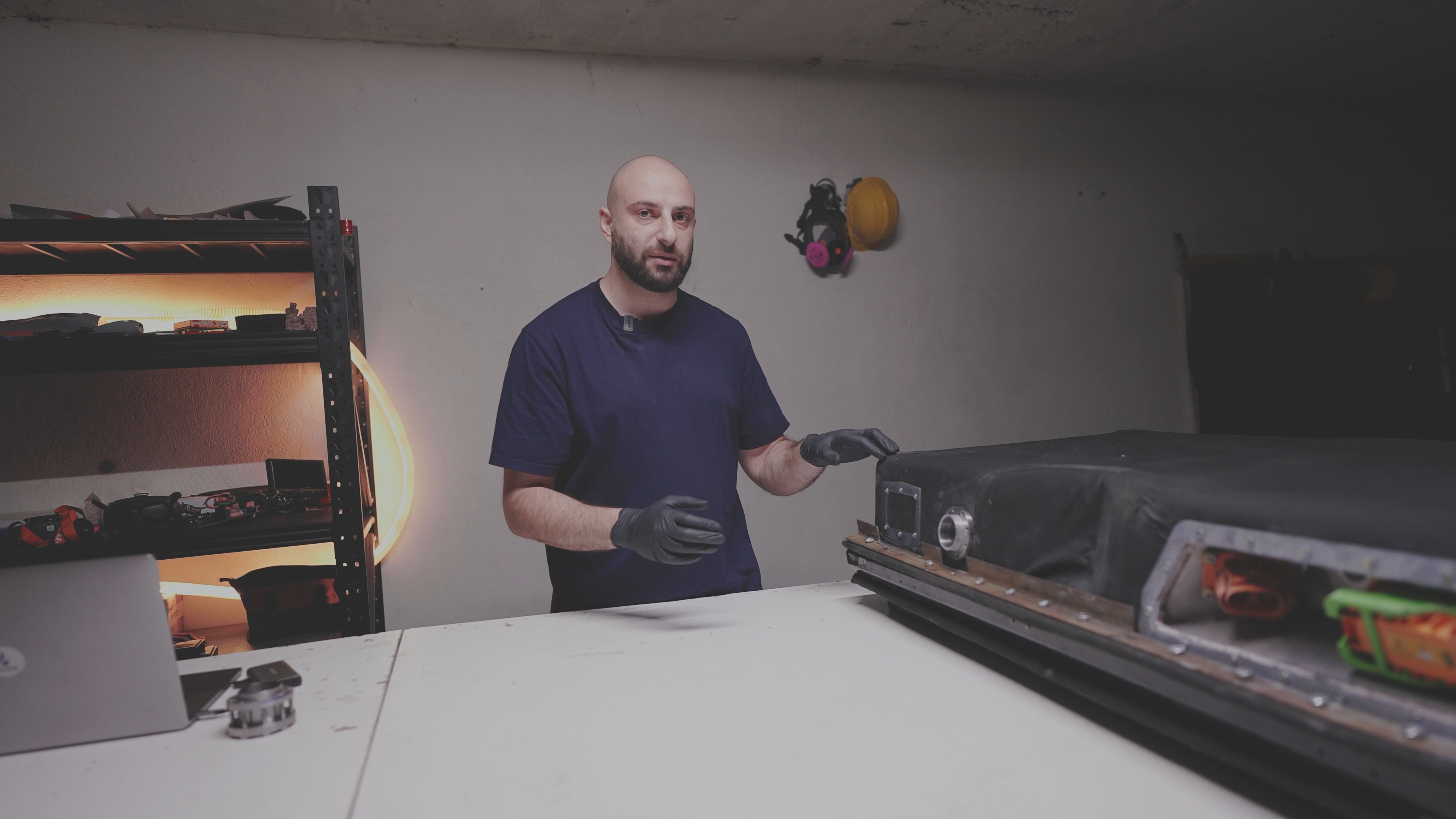
With expertise in robotics, anatomy, and engineering, Sandro, Gabara, and Vamekh brought together the essential ingredients needed to create an innovative firefighter suit. However, none of them had experience in tailoring, let alone designing a garment from an entirely new material. That is how clothing designer Bella Butskhrikidze joined the team.
“Before Bella, I sewed uniforms with my grandmother’s Singer machine. Sandro was in despair, thinking we would be ruined,” Vamekh laughs. “Bella appeared in our lives like a new character joining a team weakened by battle in anime. She appeared to know something cool with just one movement of her eyes.” According to Bella herself, working with the composite material created by Elven Tech was not easy: “The material was so unfamiliar to me that I initially thought about giving up, but this amazing team and their idea made me decide to give it a try.” Bella created an incredibly detailed suit made of multi-layered material, and just like that, Elven Technologies had their first tangible product that could be shown to potential investors as it burned (or, rather, failed to burn).
“Before Elven, I thought my best skill was planning,” Vamekh says with a smile. “However, building my own startup made me realize that being able to react quickly to changing circumstances is more important than planning.” Sandro also understands the need to take bold steps in critical moments: “At the start of the pandemic, when we ran out of funds and lost our office, we decided to use the remaining money to move into a garage and work without pay until we created the prototype. We were absolutely certain that our venture would pay off.” Working on a new idea under challenging conditions brought the team members together in a completely different way. “The main pleasure of working at Elven is the team and our jointly performed ignition tests,” proclaims Gabara. “Each team member is a unique character, and you always learn something interesting while interacting or working with them.”
The company’s journey took its current course when Vamekh went to the United States with two fireproof suits to test the waters. “In a strange coincidence, I was traveling by car when I saw a Tesla on fire on the side of the road. I later met with firefighters, where I learned how difficult it was to extinguish fires caused by electric battery explosions due to the high temperature and scattering of red-hot metal fragments.” Vamekh began researching this topic and was a little confused when he discovered that the temperature of a burning lithium battery can reach up to 2,000 degrees Celsius. Previously, all Elven’s tests were designed to handle temperatures of up to 1,200 degrees (the maximum temperature of a standard fire). The team realized that to showcase the full potential of their composite material, future demonstrations would need to involve wrapping a lithium battery in the material and exposing it to controlled explosions. They also learned that the lithium battery safety market was 400 times larger than the personal equipment market.
The initial experiments showed promising results. Elven’s flagship product demonstrated exceptional resilience, enduring fires of extremely high temperatures without compromising safety. “No technology in the world can stop lithium battery combustion, and many international companies have to deal with this problem. We have found a truly unique niche in this regard,” says Vamekh. As demand for electric vehicles grows, the need for such innovative solutions becomes increasingly urgent, considering that statistically, 25 out of every 10,000 Tesla vehicles explode spontaneously.
“Our goal is not to solve the problem of battery fires. Other companies are already working in this field. We are creating packaging that will protect human life and property if a battery catches fire,” Vamekh explains.
Having shifted their focus to the electric vehicle industry, the startup quickly attracted the attention of investors and other players in the startup ecosystem. According to the managing director of Axel, Iro Tsagareishvili, Elven Tech is currently one of the fastest-growing startups in their portfolio: “Elven Technologies was a standout startup for us from the very beginning, mainly because they create hardware and deep tech products, which is very rare in Georgia. Thanks to the team’s tireless work and strong spirit, investors believed in this idea from an early stage,” notes Iro.
The company took second place among startups from 37 countries at the 2024 Startup Tour and was named a Deep Tech Pioneer at the Hello Tomorrow Global Summit. At the same time, it held talks with major players in the global auto industry, including Tesla and General Motors. The company currently operates from Estonia, where it is developing a pilot product for self-driving shuttle manufacturer Auve Tech. “Everyone agrees that lithium-ion battery explosions are a serious problem, so many people are interested in the solution we offer,” says Vamekh.
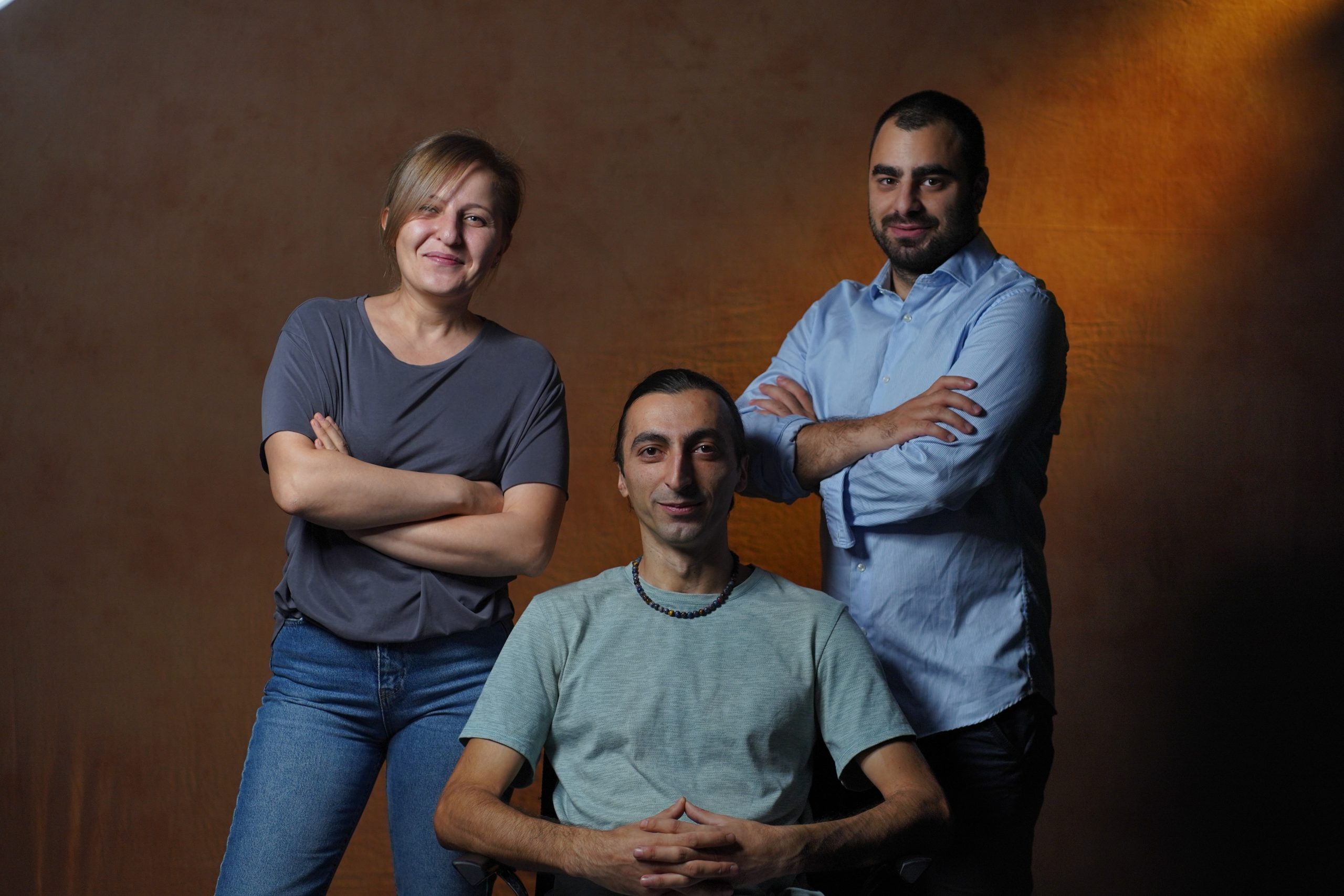
In recent years, Elven Technologies divided its business into two parts: first, creating battery packaging for electric cars and other types of electric transport (that is, products tailored to the specifications of each vehicle), and second, offering a ready-made solution to companies that are part of the battery transportation chain. “Before a battery reaches the manufacturer from the factory, it goes through at least ten stages, and at each stage, there is a risk of fire. In this type of cooperation, Elven can pack shipping containers with its materials, making the shipping process completely safe.”
The talks with major automakers also revealed the need for reliable lab tests. In Tbilisi, the company was still testing firefighter uniforms in a makeshift way, with the help of mannequins equipped with temperature sensors, and it was time to move to a new level gradually. Elven currently has three different types of composite materials, all of which are tested by Underwriters Laboratories (UL) in the U.S.: “There is a 10-cycle combustion test for fire resistance of lithium-ion batteries. Not only is the temperature resistance tested, but also how well the material withstands the risk of being torn apart by debris. Even the weakest of our six composite models demonstrated fire resistance for 40 seconds during the third combustion cycle. In the case of the most resistant versions, the fire did not penetrate the material during the tenth cycle,” Vamekh explains. Out of all the common materials, only concrete has such resistance.
Vamekh notes that despite the impressive results, the company never stops working on improving its products: “We plan to register two new patents in the spring of 2025. After filing a patent application, you have two years before it becomes public and your competitors see what you are doing. You must refine your technology further during that time and always be a few steps ahead.”
Elven’s unique fire-resistant technology not only prevents lithium-ion battery fires but also turns potentially catastrophic incidents into manageable ones. The company’s main challenge at this stage is finding partners and setting up production lines for products that are already in high demand. In Vamekh’s own words, this stage in a startup’s life is akin to the first leap from the nest: “There comes a moment when a bird has to fly for the first time. It has never flown before, but it feels like it is time to make the jump. Taking the leap is one thing, but how you manage that leap and whether you’ll be able to gain altitude is another matter.”
Members of the Elven team have plenty of courage and self-confidence, which also comes from experience. Vamekh recalls that the company was in danger of extinction at least seven times. If the situation initially scared him, he now knows that he must trust his team and the turn of events: “We have seen many times that we can handle any challenge. If the next step isn’t immediately apparent, we’ll sleep on it, wake up, and know what to do.”
“Sometimes we would spend months solving a technological problem,” Gabara recalls. “In such times, you should stay calm, and a solution will appear. I have full confidence in this process.”
Vamekh’s main lesson from his six years of startup life is that you have to believe in your product, your team members, and yourself equally: “Demonstrating trust is important. I genuinely feel that each member of my team will take responsibility for their work and do everything as needed without me having to intervene.”
“As a team, we agree on two core principles that motivate us to move forward,” says Sandro. “The first is that technological progress is significant for the future of humanity, and the second is that there really are no technological problems that we cannot solve,” Sandro claims that financial success was never a major factor for the founders of Elven. “We just love tackling difficult tasks.”
Over the five years of its existence, the startup has changed its trajectory, business model, and location, but it has never deviated from the belief that innovation should serve the public good. The journey of Vamekh, Sandro, Giorgi, and Bella exemplifies how unwavering belief in an idea, combined with expertise and perseverance, can turn seemingly insurmountable challenges into milestones of success. It seems that the only fire that does not require resistance is the fire that comes from within.

